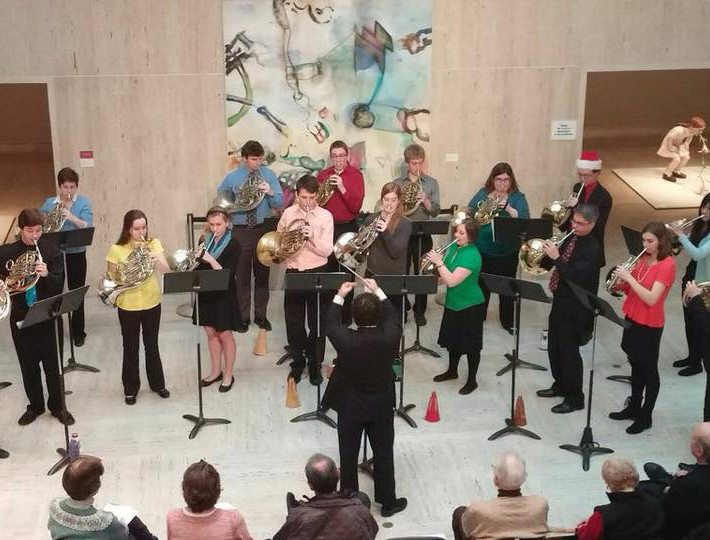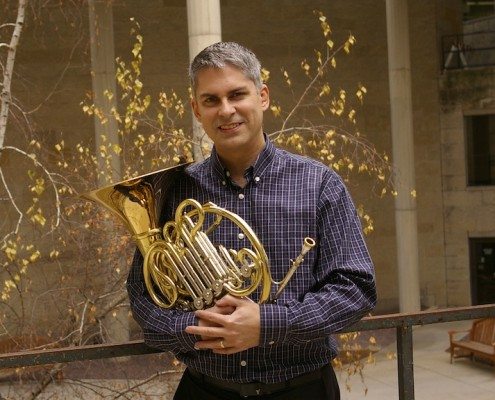At the School of Music’s “Horn Choir” concert at the Chazen Museum of Art last month, one could easily discern John Wunderlin from the swarm of horn players on the stage.
He was the only one with gray hair.

UW’s Horn Choir at a recent concert, at the Chazen Museum. Wunderlin is second from right. Daniel Grabois, conductor.
That’s because he’s 50 years old. It’s safe to say that most of the other performers were about the ages of his two kids, 23 and 19. And yes, he is a student.
After a full life as a business owner, husband and dad, Wunderlin returned to school this fall for a master’s degree in horn. He first studied the instrument in college (way back when) and played as much as possible over the years. But after he met Dan Grabois, assistant professor of horn at UW-Madison, he finally took the leap and applied for the program at UW. He says he likes Dan’s teaching style. “[Dan] offers a lot of concrete suggestions, as opposed to someone who says, ‘it’s my way or the highway,’ ” Wunderlin says.
We asked John to tell us a bit about his unusual career path.
What made you want to come back to school for a masters degree?
“It was always a long-term goal of mine to come back to school. My undergraduate degree was computer science with a music minor from UW-Platteville. As an undergrad, I made a conscious decision to earn a degree that would allow me to make a good living, but music was always my passion. With a long career in computers and both my children grown, it seemed like the right time to focus on music.

John Wunderlin. Photo by Katherine Esposito.
What was your previous career, and how did the horn fit in?
“I spent 27 years working as a computer programmer. First for several large corporations, then as an independent contractor, and for the last 14 years I ran my own software business with my wife Nancy. After college, I didn’t stop playing the horn. I was always looking for gigs, but did try to balance my rehearsal schedule with my home life- we have two children. In 1999, I came across a summer camp called the Kendall Betts Horn Camp in New Hampshire. This is a camp for horn players of all ages from high school to seniors with world-class horn faculty. It was a week-long opportunity to immerse in music that I have taken advantage of nearly every year since. I credit KBHC with improving my playing significantly to the point that I won my first regional orchestra audition with the Beloit-Janesville Symphony (now called the Rock River Philharmonic). I’ve been a member there for the last six seasons.
Why UW-Madison?
“I’ve played a lot of gigs in the Madison area and my wife and I both love the town. We lived in Mineral Point for the last 21 years. This was a good opportunity (and a good excuse) to move to Madison. I considered a few other universities, but after working with Dan Grabois and considering my options, it was really an easy choice.
What is it like being having student colleagues in their 20s and even late teens?
“The other students in the horn studio have been absolutely terrific! From day one they treated me like just another student. I’m amazed at the sense of camaraderie and lack of competitiveness within our studio. I feel like everyone’s goal is to support and help each other become the best musicians we can all be.
Have you had any trouble adapting or fitting in?
“Very little. I’m not the only non-traditional student in the music department. There are a range of ages, though I’m probably a bit above the median.
What do you hope to gain from the degree and the experience here at UW?
“My primary short-term goal is full musical immersion for the next two years. Beyond that, I’m interested in winning a larger orchestra job and/or teaching at a college or university.
Any advice for people thinking of going back to school for a performance degree?
“The field of music performance is an extremely competitive area with many, many more musicians than available jobs. My first recommendation would be to save a lot of money before starting to give yourself some time to find a job and consider other options if things don’t work out. My second recommendation is to jump in with both feet. It’s a lot of hard work, but also very rewarding. When I’m performing with a great group of musicians and in ‘the zone,’ there’s nothing else I’d rather be doing. Personal problems, politics, bad thoughts all melt away and are replaced with a musical connection with my talented colleagues that transcends words.”
